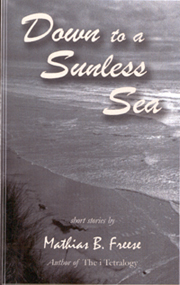|

Down to a Sunless Sea
Mathias B. Freese
By Alyce Wilson
Down to a Sunless Sea is a thought-provoking collection of short
stories by Mathias B. Freese, author of The
i Tetralogy. Many of these stories feature flawed protagonists:
some possess character flaws, while others face physical challenges
such as deformity or mental illness. One way or another, these characters
find resolution, whether through self-acceptance, comeuppance, resignation
or revelation.
The protagonist in "I'll Make It, I Think," for example,
suffers from multiple physical problems, and he says, "I often
feel like a Slinky flopping down a stoop when I speak." He adds,
a paragraph later, that "Everything I say and do has a glitch in
it." In his case, salvation comes from self-deprecating humor.
By the end of the story, he's come to terms with his condition.
In another story, "The Chatham Bear," a visitor to a small
town is bemused to note the uproar produced by bear sightings when,
it turns out, some of the residents are more vicious in their behavior
than a wild animal. This is a pattern carried across several stories,
where characters strive to reconcile thoughtless and sometimes brutal
behavior.
Several of the stories delve into pathological family dynamics, such
as in "Unanswerable," an excerpt from i Tetralogy,
where a man recalls an emotionally-scarring trip to the beach with his
former Nazi father. In "Herbie," an enterprising young boy
strives to set up a shoe-shine business, despite his father's abusive
comments. And in "Mortise and Tendon," a sensitive young boy
suffers the perpetually critical comments of his mother, while rebelling
inwardly.
Whether it's a story about the inner thoughts of someone with obsessive
compulsive disorder or about an emotionally stunted man incapable of
closeness, each story is a metaphor for our flawed human existence.
Freese calls our assumptions into question and argues for the sort of
compassion and understanding that can, ultimately, lead to transcendence.
Rating: **** (Must Read)
Wheatmark, 2007: ISBN 978-1-58736-733-5
|